THEA MUSGRAVE at Ninety Five
Rich and powerful musical language and a strong sense of drama have made Scottish-American composer Thea Musgrave one of the most respected contemporary composers in the Western world. Her compositions were first performed under the auspices of the BBC and at the Edinburgh International Festival. As a result, her works have been widely performed in Britain, Europe and the USA, and at the major music festivals, such as Edinburgh, Warsaw Autumn, Florence Maggio Musicale, Venice Biennale, Aldeburgh, Cheltenham and Zagreb; on most of the European and American broadcasting stations; and in many regular symphony concert series.
From time to time she has conducted her own works: the premiere performance of Mary, Queen of Scots at the 1977 Edinburgh International Festival and later with the San Francisco Spring Opera; the premiere performances of The Voice of Ariadne in Britain and again in New York and Los Angeles for the New York City Opera; and many orchestral concerts (Philadelphia, San Francisco, St Paul Chamber, Los Angeles Chamber, BBC Symphony, BBC Scottish Symphony, Royal Scottish National, Hong Kong Philharmonic, Jerusalem Philharmonic, etc.). It is a measure of her talent and determination that Thea Musgrave has earned great respect for her work both as a composer and conductor at a time when these were still rather uncommon professions for a woman.
Born in Edinburgh, Scotland on 27 May 1928, she studied first at the University of Edinburgh and later at the Conservatoire in Paris, where she spent four years as a pupil of Nadia Boulanger, before establishing herself back in London as a prominent member of British musical life. In 1970, she became Guest Professor at the University of California, Santa Barbara, which anchored her increasing involvement with the musical life of the United States. In 1971, she married the American opera conductor Peter Mark, and has resided in the U.S. since 1972. In 1974, she received the Koussevitzky Award, resulting in the composition of Space Play, which after its London premier was performed in New York by the Lincoln Center Chamber Players. She has also been awarded two Guggenheim Fellowships, in 1974-75, and again in 1982-83, and was recognized with honorary degrees by Old Dominion University (Virginia), Smith College, Glasgow University and in May 2004, the New England Conservatory of Music in Boston. She was awarded a CBE in The Queen’s New Year’s Honour List in January 2002. As Distinguished Professor at Queens College, City University of New York from September 1987-2002, Musgrave has guided and interacted with many new and gifted young student composers.
AN APPRECIATION
by Dr. Harold Rosenbaum
I consider Thea Musgrave to be in the lineage of illustrious British composers of choral music over the last 100 years, which includes Benjamin Britten, Edward Elgar, Ralph Vaughan Williams and Jonathan Harvey. And like the greatest of those colleagues, Benjamin Britten, every moment of each of her works for choir is fascinating, riveting, hauntingly beautiful, and unique.
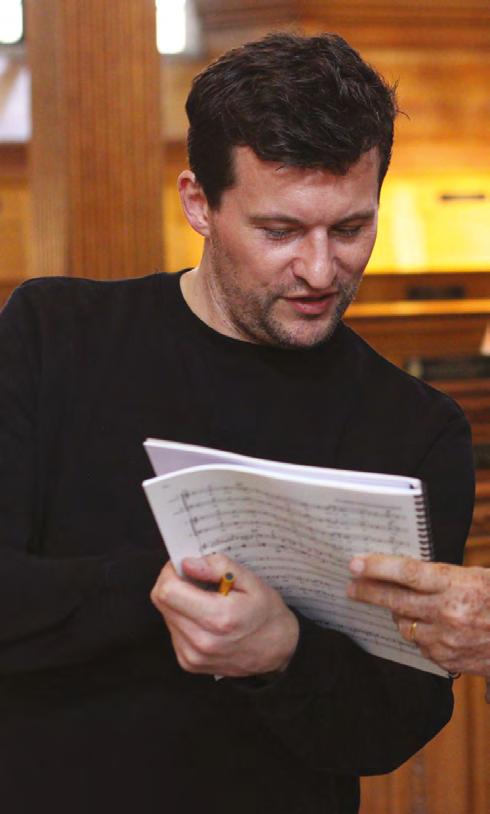

I first met Thea when we were both teaching at Queens College, City University of New York, where she was a Distinguished Professor of Composition from 1987-2002. She was (and still is!) affable, charming, and humorous. I had been wondering for a long time why, when in 4/4 time, e.g., and particularly with published English music over the centuries, whole notes were tied over to eighths when it seemed obvious to me that singers should cut off on the downbeat. I posed that question to her, and, leaning forward, she said, “It’s a stupid British tradition!”
It was during that period that I became acquainted with, and started performing, her choral works, first with my volunteer choir, The Canticum Novum Singers, and later with my professional choir, The New York Virtuoso Singers, subsequently conducting over a dozen of them. Her presence at rehearsals has been a blessing; her artistic vision, piercing intellect, powerful sense of drama (which infuses her works) and cordial suggestions complemented and fortified my efforts to do unmitigated justice to her works. One particularly gratifying collaborative project stands out: Her 75th birthday concert in New York followed by the creation of a CD containing all the works on the programme. Thea called on her friend, the British actor Michael York, who enthusiastically joined us as narrator in the main work on the programme: For the Time Being: Advent, which I consider to be her a cappella choral masterpiece.
Her Music
Thea writes in an extended tonal, highly chromatic language, and captures our attention with consummate beauty mixed with gripping tension and ambiguity. In those ways, her writing is like that of the Dutch composer Tristan Keuris, and Arnold Schoenberg, in works like Verklärte Nacht (Op.4), and Friede auf Erden (Op.13). In works such as On the Underground Set 3: A Medieval Summer, Ithaca, and Voices of Power and Protest, she interweaves both recurring and new ideas in a dazzling fashion. In this regard, her music is much like that of Richard Wagner. She often treats choirs in the same fashion and with the same emotion and passion with which Gustav Mahler handled his orchestra, relentlessly probing its inner workings, and habitually compartmentalising instruments before using them collectively. Her vocal instrumentation and textures (mostly contrapuntal) are kaleidoscopic, with unremitting revelations launched from a restless and fertile mind.
Thea imbues many of her choral works with theatrical elements. Here she once again takes the lead not only from Britten, with his dramatic movement in non-operatic works such as Saint Nicolas, Noye’s Fludde, and A Hymn to the Virgin, but even from Purcell (who had a sizeable influence on Britten), with his dramatic masques involving dancing, acting and an elaborate stage design, as well as singing and playing. In her stunning anti-war work, Voices of Power and Protest, the chorus not only sings, but enacts the drama. In her recently composed The Voices of Our Ancestors for chorus, soloists, brass quintet and organ, all performers remain offstage until the conductor enters, and in turn summons the performers who gradually assemble. In For the Time Being: Advent,
MUSGRAVE AT 95 AN APPRECIATION
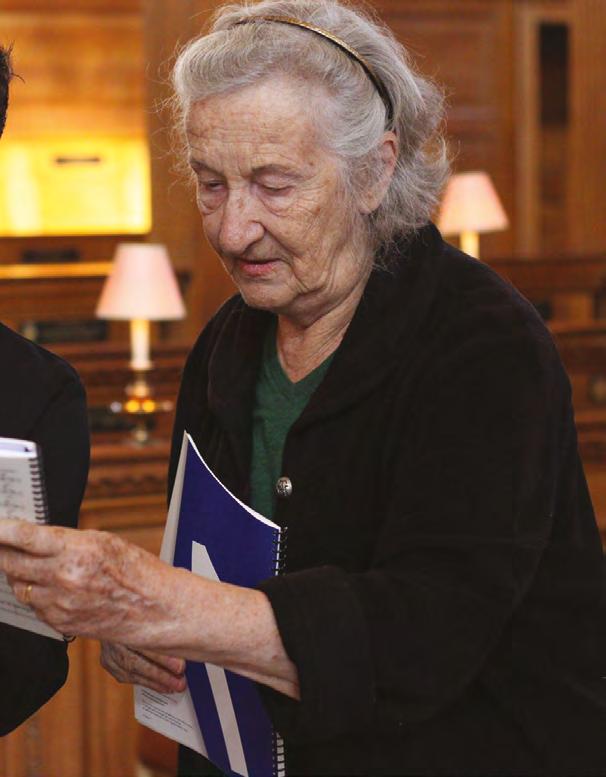

she explains that the narrator should at first sound objective and matter-of-fact, but then gradually become subjective and emotional. Later she indicates that the chorus should emulate the murmur of an approaching crowd, and that their words should only occasionally be distinct.
Thea makes certain to understand fully technical aspects and the abilities of each instrument for which she is writing (including the voice) before delving into the composition process. She recently asked me to recommend an organist with whom she could meet to gain an even fuller understanding about the organ, although she had already written brilliantly for it in her sumptuous The Lord’s Prayer.
Another fascinating element of her work is how she juxtaposes poetry/text from various sources into one cohesive and coherent musical work, as Britten did in his Voices for Today, Elgar did in The Apostles, and, of course, Brahms did in his Ein Deutsches Requiem. In The Voices of Our Ancestors, Thea immersed herself in the poetry of other cultures and distant times, ultimately choosing twelve poems in nine languages that spoke with great meaning to her. And then there are the earlier charming works: Four Madrigals and John Cook, which already display evidence of a master at work, not unlike the many early tonal choral works by Elliott Carter. Very few composers throughout the history of Western music have produced brilliant pieces with every attempt. I am not acquainted with every work Thea has written. However, every one of the dozens I have conducted and heard has been spellbinding from beginning to end. She is truly one of the greatest composers that we have been blessed to have. Long live Thea! And thank you for enriching the lives of millions of people, and for creating a treasure trove of music for future generations.
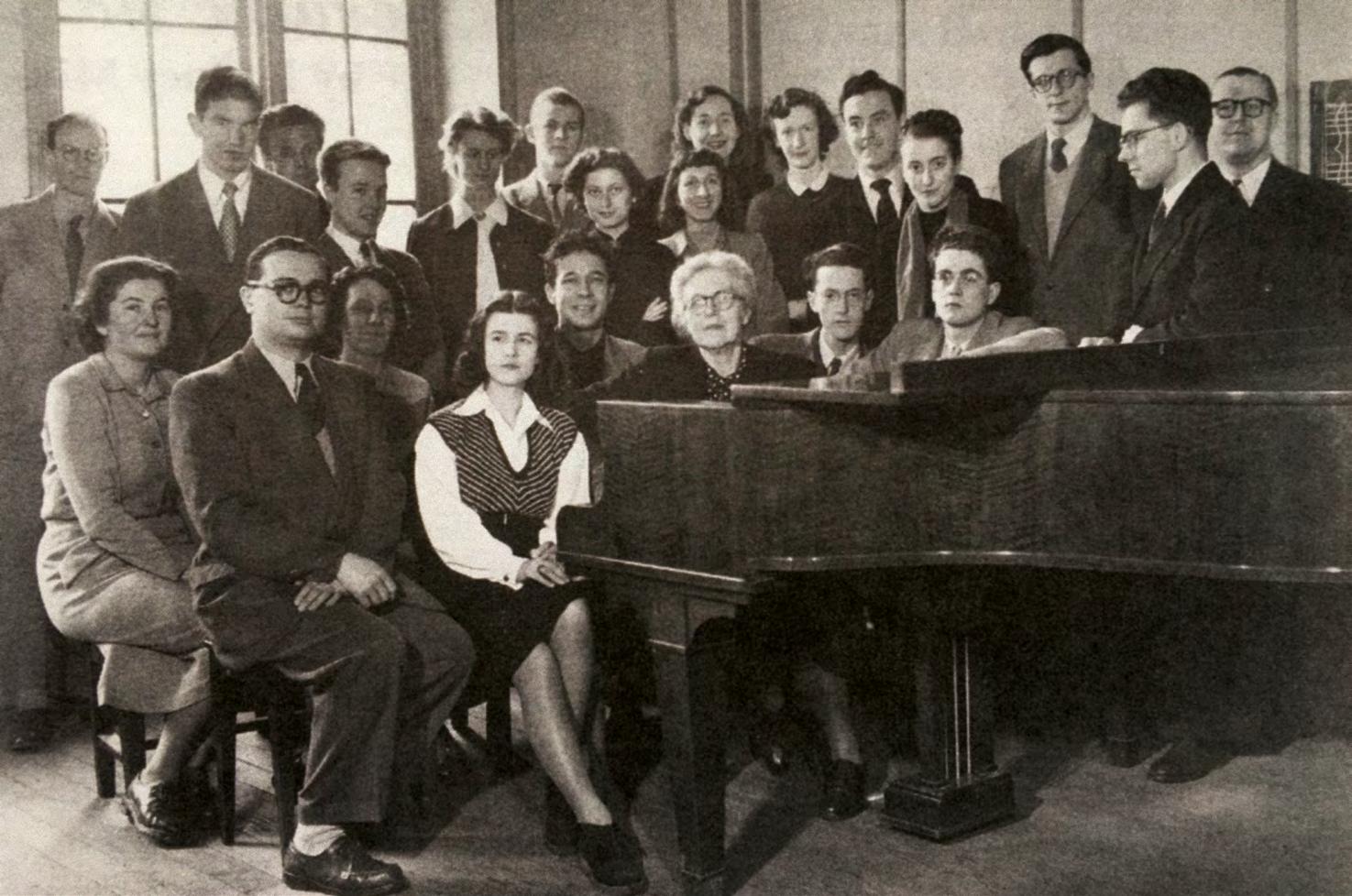


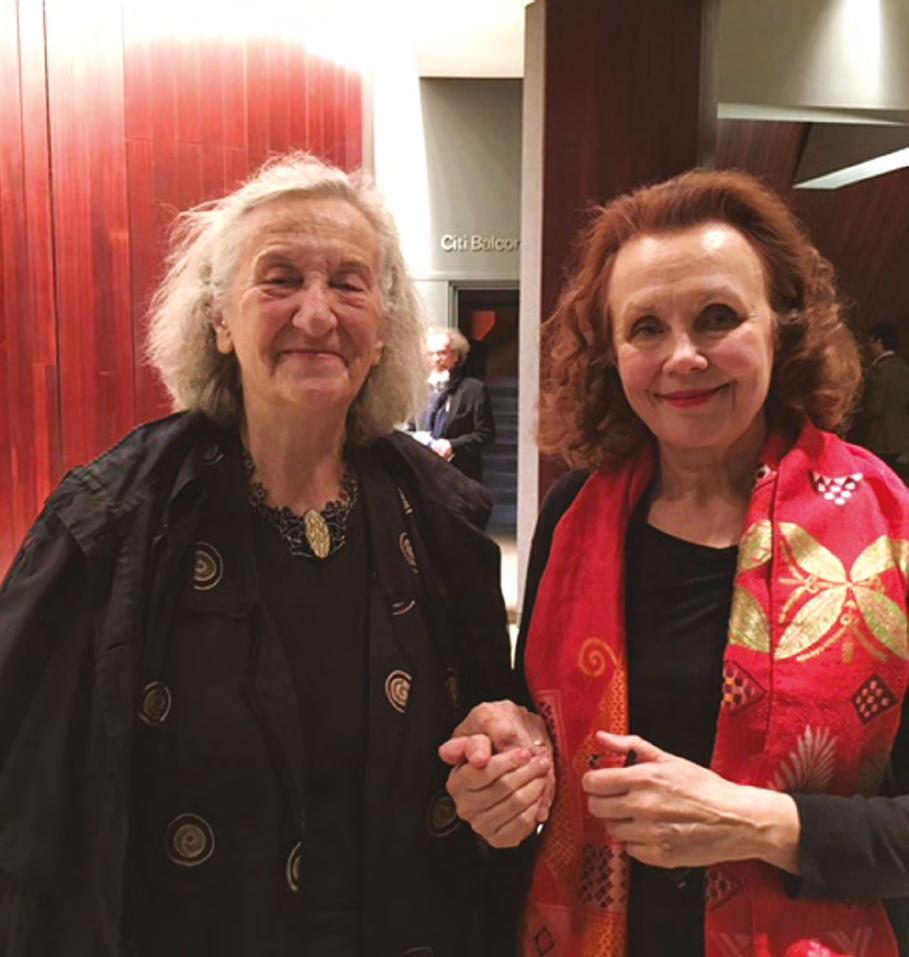
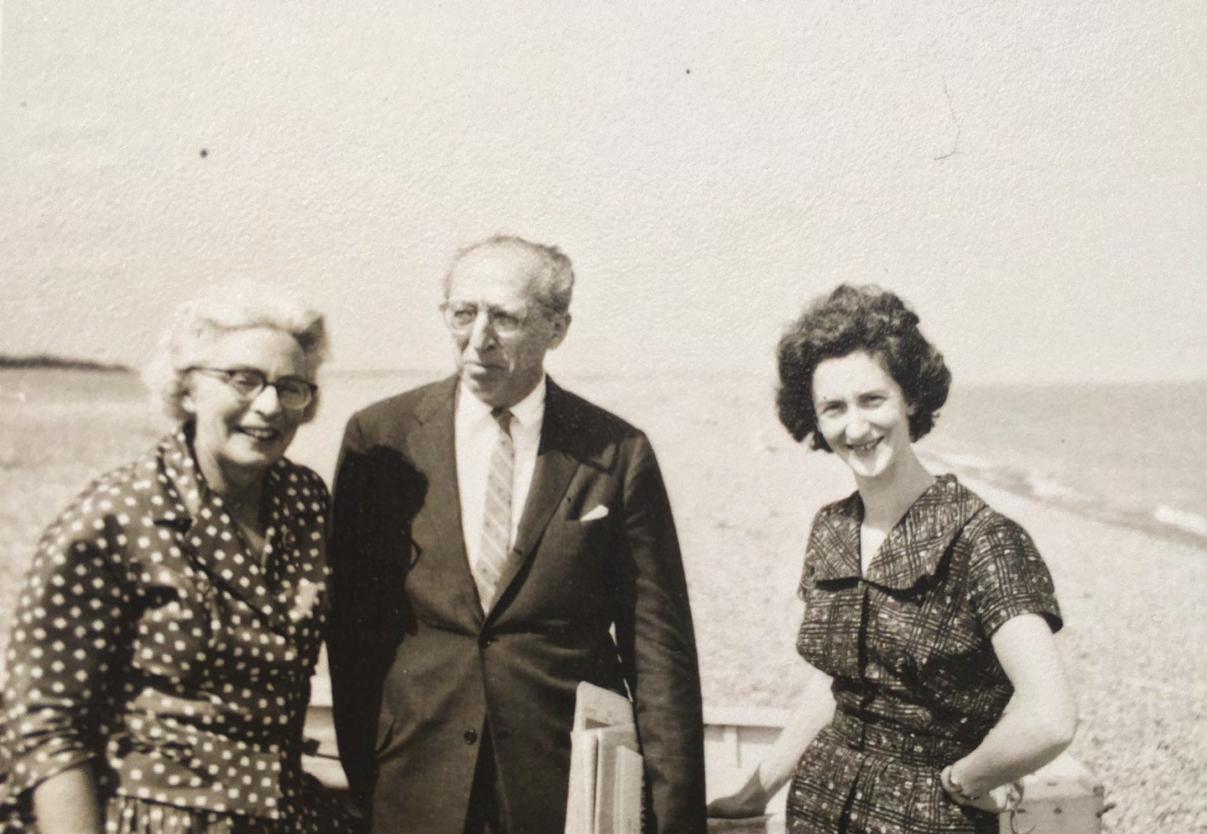
 Top: Thea Musgrave with Ashley Catling at the The Voices of Our Ancestors.
Right: Thea Musgrave with Finnish Composer Kaija Saariaho following a performance by the Juilliard School’s Axiom Ensemble in New York, December 2016.
Top: Thea Musgrave with Ashley Catling at the The Voices of Our Ancestors.
Right: Thea Musgrave with Finnish Composer Kaija Saariaho following a performance by the Juilliard School’s Axiom Ensemble in New York, December 2016.
MUSGRAVE AT 95 AN APPRECIATION
Below: The class of Nadia Boulanger (centre) at the Conservatoire with Musgrave standing in the back row.
WORKS FOR UPPER VOICES AND PIANO OR ORGAN ACCOMPANIMENT
ADAM LAY YBOUNDEN (2012)
Children’s Voices/Piano
2’
NOV295372
BLACK TAMBOURINE (1985)
SA/Piano/(Percussion)
Hart Crane
I. North Labrador
II. Legend
III. Black Tambourine
IV. My Grandmother’s Love Letters
V. Pastoral
VI. Repose of Rivers
17’30”
Vocal Score – NOV160257
Score/Parts – Hire Only
CD – Bridge 9161
GOING NORTH (2004)
Children’s Choir/2 Clarinets
John Keats
7’
Vocal Score – NOV955273
Clarinet Parts – NOV955273-01
MAKE YE MERRY FOR HIM THAT IS COME (1961)
SA Chorus/Children’s Choir with Optional Organ
15th Century Anon.
3’
Vocal Score – CH08834
Optional Organ Part – CH56580
NURSE’S SONGS OF INNOCENCE
AND EXPERIENCE (2013)
SA/Piano
William Blake
4’30”
NOV163955
MUSGRAVE AT 95 CHORAL MUSIC
MUSGRAVE AT 95 CHORAL MUSIC
5
MUSGRAVE AT 95 CHORAL MUSIC
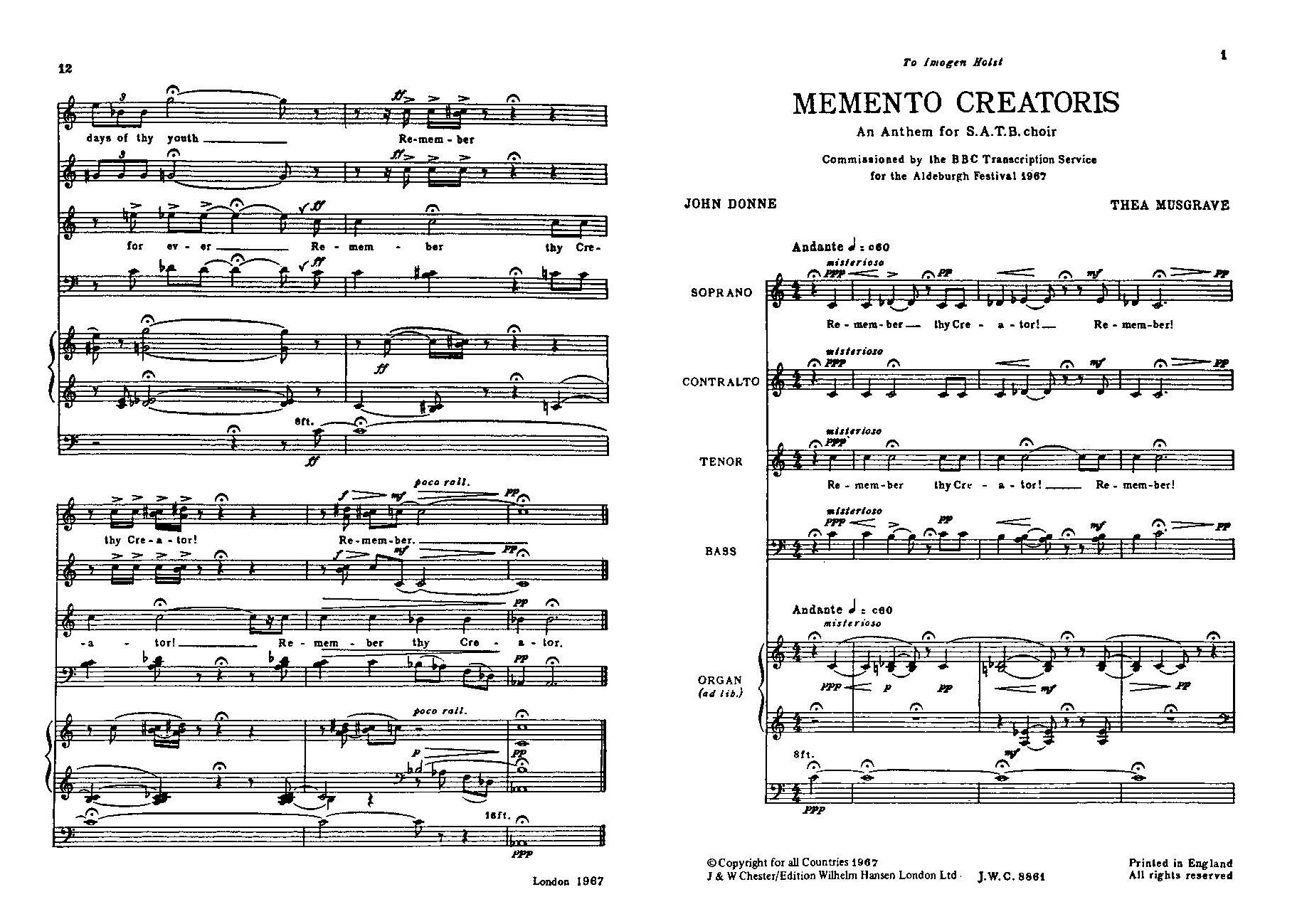
6

WORKS FOR UNACCOMPANIED MIXED VOICES FOR THE TIME BEING: ADVENT (1986)
Narrator/SATB
W.H. Auden
23’
NOV070513
CD – Bridge 9161
FOUR MADRIGALS (1953)
SATB
Sir Thomas Wyatt
I. With serving still
II. Tanglid I was in love’s snare
III. At most mischief
IV. Hate whom ye list
8’
CH07742
CD – LE328
HEAR THE VOICE OF THE BARD (2013)
Trebles/ATB
William Blake 3’
NOV164527
ITHACA (2009)
SATB
C.P. Cavafy (trans. Avi Sharon)
10’
NOV079079
JOHN COOK (1963)
SATB
Anon.
1’
NOV401450
CD – Bridge 9161
MEMENTO CREATORIS (1967)
SATB/Organ ad lib
John Donne 4’
CH08861
95 CHORAL MUSIC 7
MUSGRAVE AT
O
CARO M’È IL SONNO (1978)
SATB
Michelangelo 2’
NOV160169
ON THE UNDERGROUND SET 1 – ON GRATITUDE, LOVE AND MADNESS (1994)
SATB
I. Benediction (James Berry)
II. Her anxiety (W.B. Yeats)
III. Lady “Rogue” Singleton (Stevie Smith)
IV. Much Madness is divinest Sense (Emily Dickinson)
V. Aunt Jennifer’s Tigers (Adrienne Rich)
VI. Sometimes (Sheenagh Pugh)
10’
NOV160270
CD – Bridge 9161
ON THE UNDERGROUND SET 2 – THE STRANGE AND THE EXOTIC (1994)
SATB
I. Dreams (Robert Herrick)
II. I saw a peacock with a fiery tail (Anon.)
III. The Subway Piranhas (Edward Morgan)
5’
NOV160279
CD – Bridge 9161
ON THE UNDERGROUND SET 3 – A MEDIEVAL SUMMER (1995)
SATB
Anon./Chaucer
10’
NOV160284
CD – Bridge 9161
RORATE COELI
SATB
William Dunbar
11’
NOV072331
CD – USK 1216
SONG OF THE BURN (FROM CANTATA FOR A SUMMER’S DAY) (1954)
SATB
Maurice Lindsay 3’
NOV160180
STARLIGHT (2010)
SATB
Henry Longfellow 2’
NOV162371
TO SLEEP (1992/2017)
SATB
John Keats 5’
NOV360027
NOV956835 MUSGRAVE
Work originally known as ‘Midnight’. It was completely revised and renamed in 2017.
VOICES OF POWER AND PROTEST (2006)
SATB
Thea Musgrave 20’
(1973)
AT 95 CHORAL MUSIC 8
MUSGRAVE AT 95 CHORAL MUSIC
9
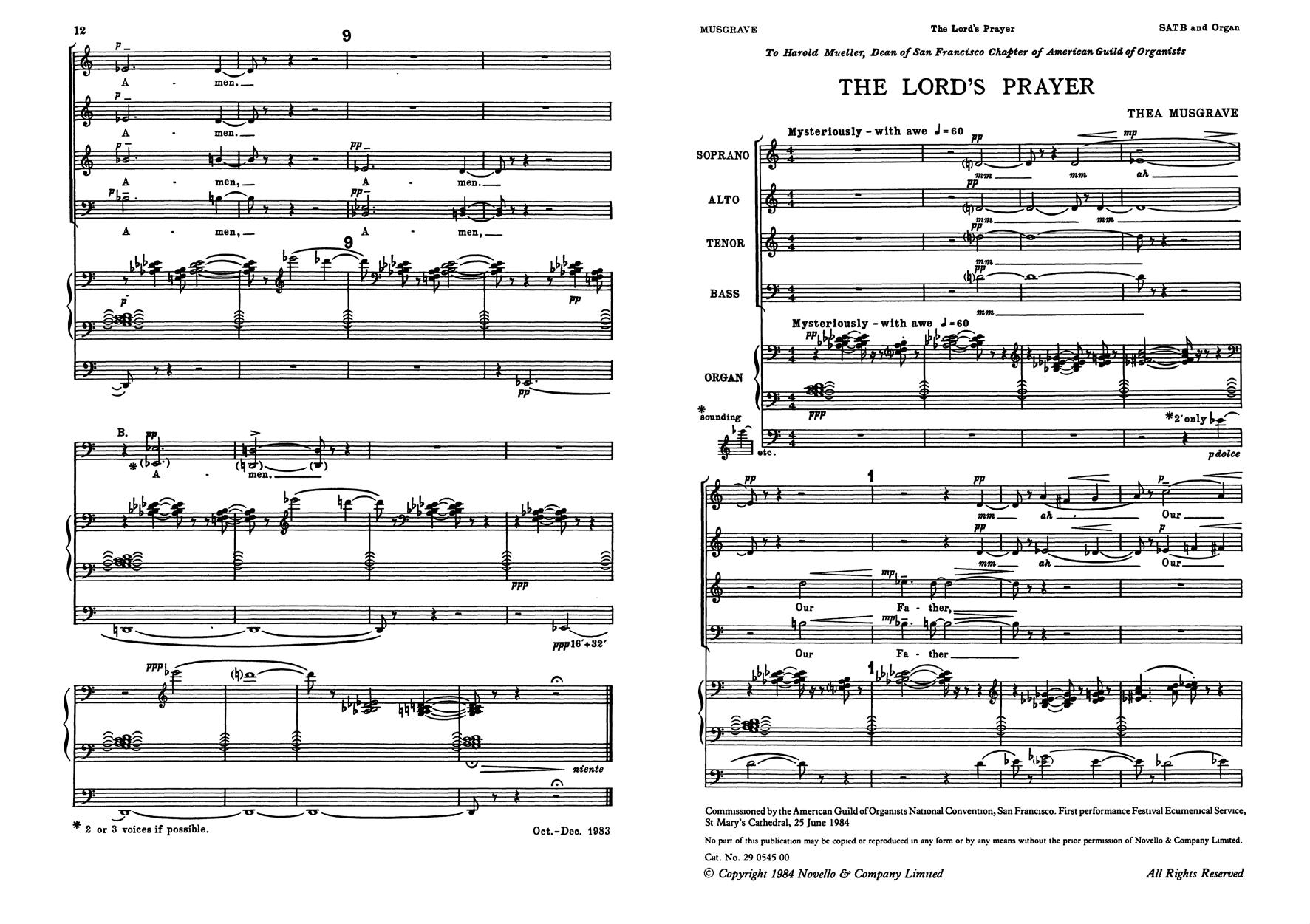
10
MUSGRAVE AT 95 CHORAL MUSIC
WORKS FOR MIXED VOICES AND PIANO OR ORGAN ACCOMPANIMENT
ADAM LAY YBOUNDEN (2012)
Children’s Voices/SATB/Piano
2’
NOV295372
THE LORD’S PRAYER (1983)
SATB/Organ
4’
NOV290545

WORKS FOR CHOIR AND ENSEMBLE / ORCHESTRA
CANTATA FOR A SUMMER’S DAY (1954)
Narrator/SATB(soli or small chorus)/ 1010/0000/str(min 1.1.1.1)
Alexander Hume/Maurice Lindsay 33’
Vocal Score, Score and Parts – Hire Only
CELEBRATION DAY (1999)
SATB/2222/2210/pf(syn)/2perc/str
John Dryden
18’
Vocal Score, Score and Parts – Hire Only
11
MUSGRAVE AT 95 CHORAL MUSIC
ECHOES THROUGH TIME (1988)
Soli: 5 women, 5 spoken roles, 3 dancers. Women’s chorus.
1+picc.1.2.1/1.0.0.0/timp,perc,hrp,pno(synth)/str
Electronic prologue and epilogue.
C.E. Cooper
32’
Vocal Score/Score/Parts – Hire Only
THE FIVE AGES OF MAN (1963)
SATB/2(pic)222/4331/timp.3perc/pf/ str+brass:2.2.2.1)
Hesiod (trans. Richmond Lattimore)
27’
Vocal Score – CH08846
Score/Parts – Hire Only
THE LAST TWILIGHT (1980)
SATB/3hn.4tpt.4tb/perc
D.H. Lawrence
13’
Vocal Score – NOV070440
Score/Parts – Hire Only
THE PHOENIX AND THE TURTLE (1962)
SATB/2(pic).2+ca.2+bcl.2/4331/timp.3perc/hp/str
William Shakespeare
18’
Vocal Score/Score/Parts – Hire Only
REMEMBERING HARRIET (1984)
Narrator/Soprano/Contralto/Baritone/ SATB Chorus/2.2(ca).2. 2(cbn)/3330/ timp.2perc/hp.pf/str
Thea Musgrave
55’
Vocal Score/Score/Parts – Hire Only
TWO CHRISTMAS CAROLS IN TRADITIONAL STYLE (1966)
SA(TB optional) Chorus/Oboe (or Clarinet or Violin)/Strings
Norman Nicholson
I. Carol for the Watchers
II. Wise Men’s Carol
5’
Vocal Score – CH08865 Score/Parts – Hire Only
THE VOICES OF OUR ANCESTORS (2014)
Narrator/SATB Soli/SATB Chorus/ Brass Quintet/Organ 30’
Vocal Score – NOV165231 Score/Parts – NOV165242
WILD WINTER I: LAMENTATIONS FOR VOICES AND VIOLS (1993)
Soprano, Two Tenors and Bass Soli/ Viol Consort (2tr.ten.2bs) 19’
Vocal Score/Score/Parts – Hire Only
WILD WINTER II: LAMENTATIONS FOR CHORUS AND STRINGS (1996)
SATB/Strings
19’
Vocal Score/Score/Parts – Hire Only
Please note this is a re-working of ‘Wild Winter I’
MUSGRAVE AT 95 CHORAL MUSIC 12
MUSGRAVE AT 95 CHORAL MUSIC
13
For information about Thea Musgrave’s operas, choral & vocal works visit theamusgrave.com & musicsalesclassical.com
Bergamo
Berlin
Copenhagen
Hong Kong
Leipzig
London
Los Angeles
Madrid
New York
Paris
Reykjavík
Sydney
Tokyo
Cover image: Kate Mount promotion@wisemusic.com wisemusicclassical.com
G Schirmer/AMP
G Schirmer Australia
Chester Music
Novello & Co
Alphonse Leduc
Edition Wilhelm Hansen
Edition Peters
Editions Transatlantiques
Choudens
Le Chant du Monde
Unión Musical Ediciones
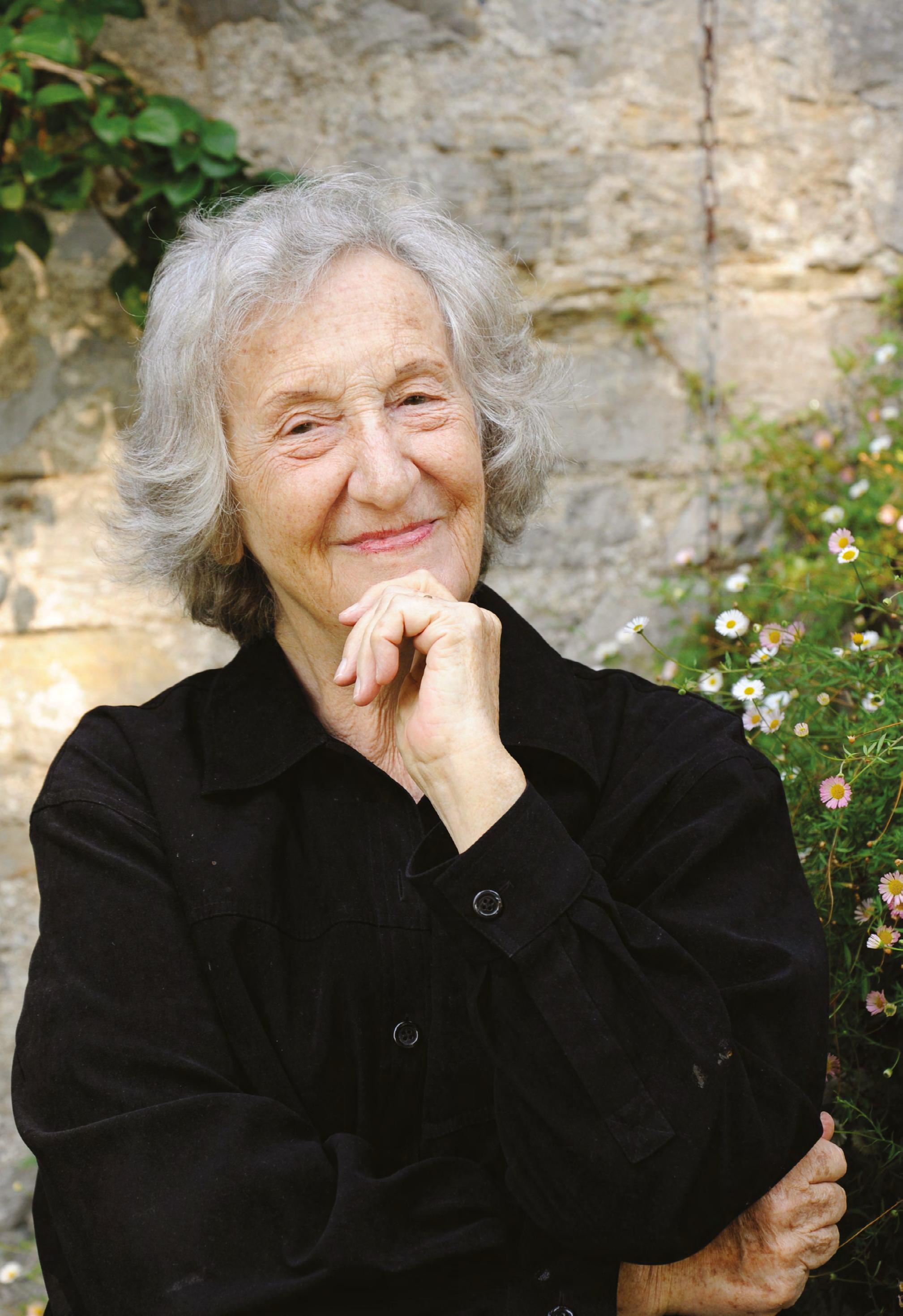
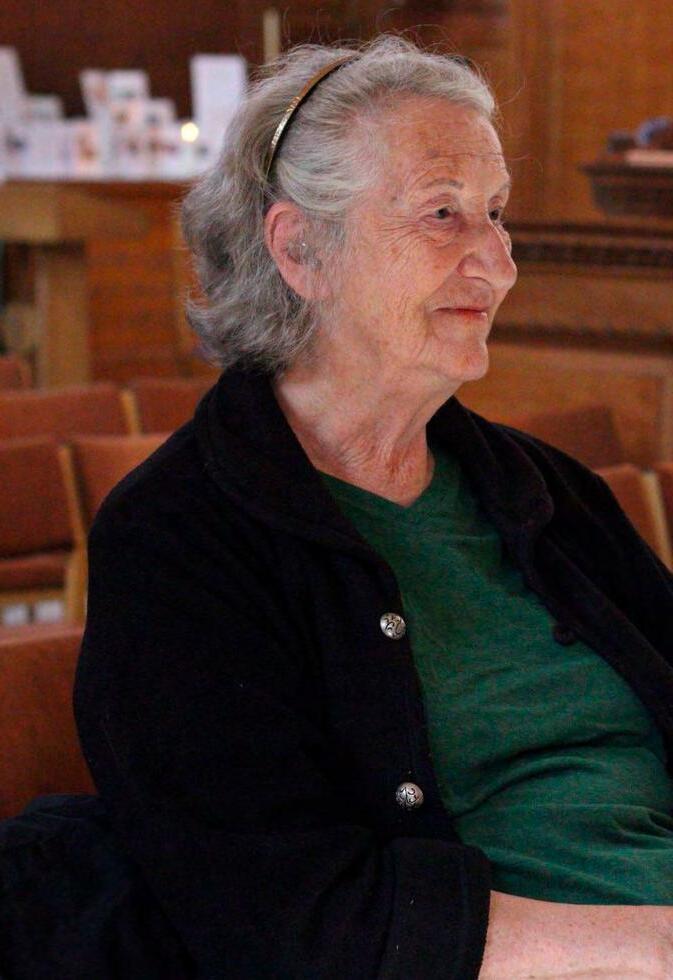
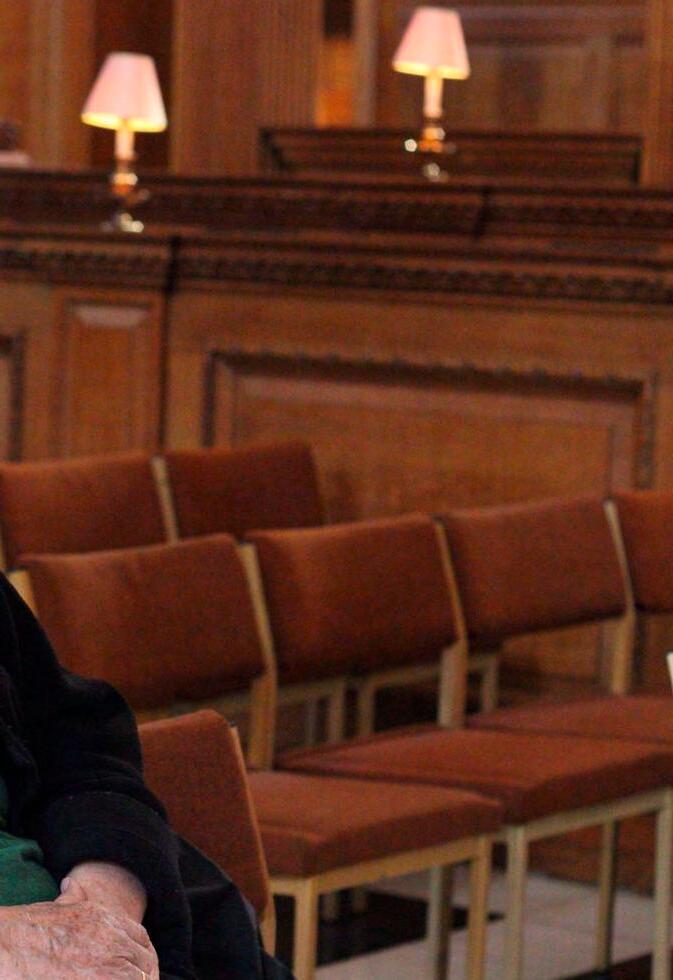










 Top: Thea Musgrave with Ashley Catling at the The Voices of Our Ancestors.
Right: Thea Musgrave with Finnish Composer Kaija Saariaho following a performance by the Juilliard School’s Axiom Ensemble in New York, December 2016.
Top: Thea Musgrave with Ashley Catling at the The Voices of Our Ancestors.
Right: Thea Musgrave with Finnish Composer Kaija Saariaho following a performance by the Juilliard School’s Axiom Ensemble in New York, December 2016.

